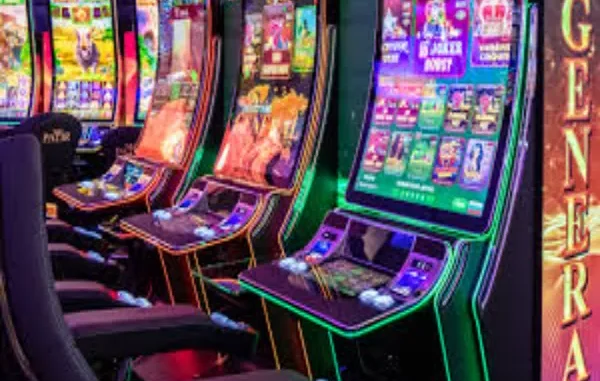
The term “Slot Town” is a deceptively simple word that carries a broad spectrum of meanings across various fields and contexts. From gambling and gaming to technology, time management, and mechanical engineering, the concept of a ” Slot Town ” finds itself deeply ingrained in multiple aspects of human life. This article explores the various dimensions of the term “Slot Town” and how it applies to different disciplines.

1. Slot Town in Gambling and Casinos
One of the most common associations with the word “Slot Town” is in the context of gambling, specifically slot machines. These machines, also known as one-armed bandits, are popular in casinos worldwide. They operate by allowing players to insert a coin or token into a designated slot, pull a lever or press a button, and spin reels that contain various symbols. Winning combinations result in payouts based on predefined odds.
Slot machines have evolved significantly with the advent of digital technology. Online slots, for instance, have become a major segment of the gaming industry, offering players a vast range of themes, bonus features, and progressive jackpots. The randomness of slot outcomes, dictated by Random Number Generators (RNGs), ensures fairness in gameplay while maintaining the element of chance that attracts millions to try their luck.
2. Slot Town in Technology and Computing
In technology and computing, the term “Slot Town” has multiple applications. One of the most significant uses is in hardware, where a slot refers to a physical opening or connector designed for expansion cards, memory modules, or peripheral devices. Examples include:
- PCI Slots: Found in computer motherboards, these allow the installation of graphics cards, sound cards, or network adapters.
- RAM Slots: These slots accommodate memory modules (RAM) that enhance a computer’s performance.
- SD Card Slots: Used in mobile devices and cameras, they enable external storage expansion.
Additionally, software applications use the term “slot” metaphorically. In scheduling and database management, slots are designated spaces for data storage, execution, or allocated time intervals for processes.
3. Slot Town in Time Management and Scheduling
In daily life, a “Slot Town” often refers to a designated time period allocated for a specific activity. This usage is common in various fields, such as:
- Airline and Railway Scheduling: Transport systems allocate slots for arrivals and departures to manage traffic flow and efficiency.
- Appointments and Reservations: Whether in a hospital, salon, or restaurant, time slots ensure orderly service provision.
- Broadcasting and Media: Television and radio networks assign slots for different shows, ensuring structured programming.
The concept of time slots helps optimize productivity and prevent conflicts in scheduling, making it a vital aspect of modern life.
4. Slot Town in Mechanical Engineering
In mechanical engineering, a Slot Town is a narrow groove or channel designed for various mechanical and industrial applications. Some common uses include:
- Key Slots: Used in shafts and gears to secure rotating components.
- Ventilation Slots: Found in electronic devices to allow airflow and cooling.
- Assembly Slots: Facilitating the easy installation of parts in construction and manufacturing.
These applications highlight the functional importance of slots in mechanical design and engineering.
5. Slot Town in Linguistics and Communication
Interestingly, the term “Slot Town” is also used in linguistics and communication. In language, a slot can refer to a placeholder within a sentence structure, allowing different words or phrases to be inserted while maintaining grammatical coherence. This concept is widely used in:
- Computational Linguistics: Chatbots and AI models use slots to fill in variable parts of a conversation.
- Language Learning: Teaching methods utilize sentence slots to help learners construct sentences with different vocabulary.
This linguistic versatility showcases how the concept of a slot extends beyond tangible objects and into the realm of structured communication.
6. Slot Town in Aviation and Aerospace
In aviation, slots are crucial in air traffic management. Airports allocate slots to airlines for takeoffs and landings to maintain efficiency and avoid congestion. These slots are regulated by aviation authorities and can be bought, sold, or leased by airlines, sometimes at significant costs.
In aerospace engineering, “slot” can also refer to a narrow opening or passage in aircraft wings, designed to improve airflow and enhance lift during takeoff and landing. Such aerodynamic slots are essential for aircraft stability and performance.
7. The Cultural and Social Impact of Slot Town
Beyond technical definitions, Slot Town play a role in social and cultural frameworks. In many societies, securing a slot in prestigious educational institutions, job markets, or elite memberships signifies privilege and opportunity. Similarly, the competitive nature of acquiring Slot Town in limited-seating events or exclusive clubs underscores the importance of strategic planning and prioritization.
The digital age has further expanded this concept with online ticketing systems and queue management strategies, where users must secure slots in high-demand activities such as concert ticket purchases or online gaming tournaments.
Conclusion
The term “Slot Town” is far more than just a reference to a coin-operated gambling machine. Its presence in various fields—ranging from technology, engineering, and time management to linguistics, aviation, and social constructs—demonstrates its widespread applicability and significance. Whether it refers to a physical opening, a time allocation, or a computational placeholder, the concept of a slot remains integral to the functionality and organization of modern life.
As technology continues to evolve, new interpretations and uses of slots will likely emerge, reinforcing their relevance in both practical and conceptual domains. From the tangible to the abstract, the humble slot continues to shape industries, innovations, and everyday experiences in more ways than one.
Leave a Reply